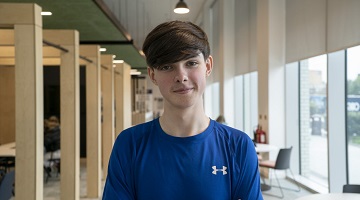2024/25 entry
BA (Hons) Media, Culture, Communication with Foundation Year
Clearing
Want to study with LJMU this September? Visit our Clearing hub to apply now if you have your grades or register your interest and become a Clearing Insider to receive updates while you wait for your results. Your journey starts with Clearing.
Minimum UCAS points required: TBC
Why study Media, Culture, Communication with Foundation Year at Liverpool John Moores University?
- Foundation year degree - this is a four year programme
- You will study media institutions such as the BBC and Netflix and the cultures of production and consumption that surround them
- You will develop professional writing skills, learn to communicate with a range of audiences, and critically reflect on what you produce
- We focus on theoretical and critical study as well as transferable skills development
- You will be taught by research-active staff and learn from media and cultural industry guest speakers
- Emphasis on employability and work-based learning from the start of your degree
- Our graduates go on to careers such as journalism, marketing, education, public relations and more
About your course
The media have a major impact on how we understand our world, ourselves and other people. The BA (Hons) in Media, Culture, Communication at Liverpool John Moores University enables you to analyse the social, cultural and political importance of the mass media, everyday culture, and the communications industries.
This BA (Hons) course offers a variety of modules covering aspects of the media, culture and communications industries with a focus on employability, career development and critical skills. The course will teach you how to write and research for a range of audiences, both academic and professional. Our students enjoy the broad range of the programme, which expands their choices after graduation, while allowing them to specialise in their own areas of interest as they progress. We examine industries like film, television and games, sectors like advertising, public relations, journalism and publishing, and aspects of everyday culture like consumerism, identity and social media.
The programme is designed with your future employability in mind. You'll develop transferable skills in research, communication, problem solving, teamwork and independent working. Although we focus on theoretical and critical study, our students work on current case studies that are developed with employers, and work-related learning is designed into all levels of study. Many students undertake exciting and rewarding placements, internships and work experience during their programme.
Foundation Year
The Foundation Year is ideal if you have the interest and ability to study for a degree, but do not have the qualifications to enter directly onto the Media, Culture, Communication honours degree programme yet.
Once you pass the Foundation Year (level 3) you will progress directly onto the first year of the honours degree. If you are a full-time UK student, you will qualify for student financial support for the full duration of your course (subject to eligibility criteria).
"The Media, Culture and Communication degree at LJMU has allowed me to utilise my creativity in ways that no other degree could have. Over the three years, I was constantly encouraged to build upon my pre-existing skills and learn new ones. Plus, I was inspired to explore off-beat topics that would push me to think outside of the box and eventually alter my view of the world for the better. I'm eternally grateful that I opted for this wide-ranging degree because it helped me realise that I'm perfectly capable of taking on a variety of roles within the creative fields. Ergo, I would recommend this degree to any imaginative thinkers who want to keep their options open."
Professional accreditation/links
We have worked with a range of organisations, including: The Liverpool Comedy Trust, Tate Liverpool, Sound City, The British Music Experience, BBC Radio Merseyside, Open Eye Galley, Merseyside Police, the NHS, ITV Studios, Everyman Theatre, the Museum of Liverpool and the Liverpool Against Racism Festival.
Fees and funding
There are many ways to fund study for home and international students
Fees
The fees quoted above cover registration, tuition, supervision, assessment and examinations as well as:
- Library membership with access to printed, multimedia and digital resources
- Access to programme-appropriate software
- Library and student IT support
- Free on-campus wifi via eduroam
Additional costs
Although not all of the following are compulsory/relevant, you should keep in mind the costs of:
- accommodation and living expenditure
- books (should you wish to have your own copies)
- printing, photocopying and stationery
- PC/laptop (should you prefer to purchase your own for independent study and online learning activities)
- mobile phone/tablet (to access online services)
- field trips (travel and activity costs)
- placements (travel expenses and living costs)
- student visas (international students only)
- study abroad opportunities (travel costs, accommodation, visas and immunisations)
- academic conferences (travel costs)
- professional-body membership
- graduation (gown hire etc)
Funding
There are many ways to fund study for home and international students. From loans to International Scholarships and subject-specific funding, you'll find all of the information you need on our specialist funding pages.
Employability
The programme is co-developed with employers and so work-related learning, case studies and projects are geared towards ensuring graduate have the skills and confidence to enter the jobs market.
We are proud that the paths followed by our graduates are so varied. Our former students are to be found working in occupations including:
- advertising and marketing
- museums
- arts administration and publishing
- television production
- print and digital journalism
- teaching
- content creation
- media and marketing start-ups
- charity and third sector communication roles
Some decide to further their studies at postgraduate level, in either theoretical or critical areas or in vocational subjects such as journalism or marketing. This includes our own MA in Mass Communications programme.
Student Futures - Careers, Employability and Enterprise Service
A wide range of opportunities and support is available to you, within and beyond your course, to ensure our students experience a transformation in their career trajectory. Every undergraduate curriculum includes Future Focus during Level 4, an e-learning resource and workshop designed to help you to develop your talents, passion and purpose.
Every student has access to Careers Zone 24/7, LJMU's suite of online Apps, resources and jobs board via the LJMU Student Futures website. There are opportunities for flexible, paid and part-time work through Unitemps, LJMU's in-house recruitment service, and we also offer fully funded Discovery Internships.
One-to-one careers and employability advice is available via our campus-based Careers Zones and we offer a year-round programme of events, including themed careers and employability workshops, employer events and recruitment fairs. Our Start-Up Hub can help you to grow your enterprise skills and to research, plan and start your own business or become a freelancer.
A suite of learning experiences, services and opportunities is available to final year students to help ensure you leave with a great onward plan. You can access LJMU's Careers, Employability and Start-up Services after you graduate and return for one-to-one support for life.
Go abroad
LJMU aims to make international opportunities available to every student. You may be able to study abroad as part of your degree at one of our 100+ partner universities across the world. You could also complete a work placement or apply for one of our prestigious worldwide internship programmes. If you wanted to go abroad for a shorter amount of time, you could attend one of our 1-4 week long summer schools.
Our Go Citizen Scheme can help with costs towards volunteering, individual projects or unpaid placements anywhere in the world. With all of these opportunities at your feet, why wouldn’t you take up the chance to go abroad?
Find out more about the opportunities we have available via our Instagram @ljmuglobalopps or email us at: goabroad@ljmu.ac.uk.
A life-changing experience
There's so much more to university than just studying for a degree.
News and views
Browse through the latest stories and updates from the University and beyond
What you will study on this degree
Please see guidance below on core and option modules for further information on what you will study.
Further guidance on modules
Modules are designated core or optional in accordance with professional body requirements, as applicable, and LJMU’s Academic Framework Regulations. Whilst you are required to study core modules, optional modules provide you with an element of choice. Their availability may vary and will be subject to meeting minimum student numbers.
Where changes to modules are necessary these will be communicated as appropriate.
Level 4
Core modules
Studying Culture
20 credits
What exactly is 'culture? How have people defined it, or made judgements about it? Why is it important to our everyday lives? How have researchers tried to study culture and what it means to people? This module aims to answer these questions!
Introduction to Media and Cultural Industries
20 credits
This module will introduce a range of key debates and approaches to the study of media, culture and communication. It will assist you in developing the conceptual and critical language necessary for studying media and cultural practice. The module will explore aspects of self-awareness in relation to personal development, employability and career planning.
Level 6
Optional Modules
Popular Fiction and Publishing
20 credits
This module poses the question: why is popular fiction popular, and how does it maintain that popularity across a range of narrative media, including books, films, TV, comics and even games? This module offers you the opportunity to analyse storytelling across a variety of commercial narrative media forms. We currently examine two case studies - the genres of detective fiction and the thriller and consider how they adapt to changing cultural climates from the 19th century to the present day. We also analyse the production and consumption of popular fiction within the context of creative, economic and institutional imperatives, to see how publishers, film companies, and other makers and distributors of media predict and fail to predict - what will be popular.
Teaching and work-related learning
Excellent facilities and learning resources
We adopt an active blended learning approach, meaning you will experience a combination of face-to-face and online learning during your time at LJMU. This enables you to experience a rich and diverse learning experience and engage fully with your studies. Our approach ensures that you can easily access support from your personal tutor, either by meeting them on-campus or via a video call to suit your needs.
Teaching is via a combination of lectures, seminar-workshops, peer presentations, online activities and film screenings, and you are expected to spend a significant proportion of your time in private study, using our virtual learning environment, Canvas, as well as our archives and special collections. There will also be opportunities for online discussion with staff and your fellow students.
Work-related Learning
Work-based learning is a vital part of this degree and gives you a taste of what its really like to work in the media and cultural industries. You will not only get to practise skills you have learnt on the course, but you will also be able to add the experience to your CV, giving you a head start when you eventually enter the competitive job market.
In fact many of our graduates have been offered a full-time position by their placement employer on the strength of successful work experience. Past students have worked with Sky Sports, Liverpool Echo, Juice FM, Odeon Cinema, the Everyman Theatre, National Museums and Galleries on Merseyside and the BBC.
Support and guidance
Dedicated personal tutor, plus study skills support
We believe that one-to-one support during your studies is vital, and for this reason you will be assigned a personal tutor from the minute you enrol at LJMU. They will arrange meetings with you to discuss course-related issues, monitor progress and help you formulate your future career plans. You will also receive support in finding and securing a work placement.
Assessment
Assessment varies depending on the modules you choose, but will usually include a combination of exams and coursework.
We acknowledge that all students perform differently depending on how they are assessed, which is why we use a combination of innovative assessment methods. These include exams (seen/unseen), essays, log books and diaries, group and individual presentations, research projects, work-based learning reports and other forms of continuous assessment including response papers, blogs, organised debates and seminars.
Constructive feedback from your tutors is designed to help you identify your strengths as well as the areas that may need further attention, and is provided by email, in writing or verbally through seminars, tutorials and personal development planning sessions.
Course tutors
Our staff are committed to the highest standards of teaching and learning
Dr Steven Spittle
Programme Leader
Steve leads the Media, Culture, Communication programme team at LJMU. He has over two decades of experience developing and delivering media programmes. His research interests focus on the role of media as resources for identity formation, with a particular interest in video games, advertising and factual television. Steve leads and teaches modules on screen media analysis, consumer culture, culture and identity and media and cultural theory. Steve is a member of the Universitys Academic Board and he is an experienced External Examiner in UK and international contexts. He has recently successfully franchised the BA (Hons) Media, Culture Communication programme to Westford University College in Dubai.
Facilities
What you can expect from your School
The School of Humanities and Social Science offers an ideal environment in which to expand your knowledge and horizons. Situated on Mount Pleasant in the new ‘Knowledge Quarter ' of Liverpool, the School is home to five subject areas: English, History, International Relations, Sociology, and Media, Culture & Communication. It has a lively programme of cross-disciplinary research seminars, conferences, visits from international scholars and public events. Research from the School is recognised nationally and worldwide.
The university reserves the right to withdraw or make alterations to a course and facilities if necessary; this may be because such changes are deemed to be beneficial to students, are minor in nature and unlikely to impact negatively upon students or become necessary due to circumstances beyond the control of the university. Where this does happen, the university operates a policy of consultation, advice and support to all enrolled students affected by the proposed change to their course or module.
Further information on the terms and conditions of any offer made, our admissions policy and the complaints and appeals process.










